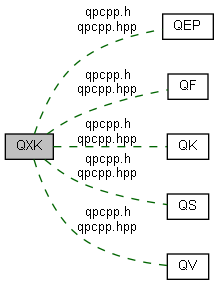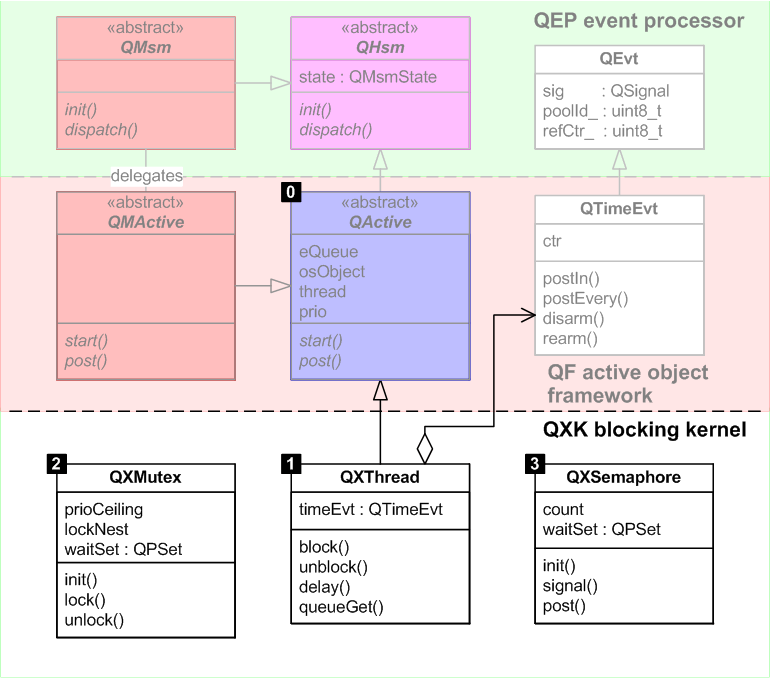Preemptive Dual-Mode (Run-to-Completion/Blocking) RTOS Kernel. More...

Files | |
| file | qpcpp.h |
| QP/C++ public interface old-version for backwards-compatibility. | |
| file | qpcpp.hpp |
| QP/C++ public interface including backwards-compatibility layer. | |
| file | qxk.hpp |
| QXK/C++ preemptive extended (blocking) kernel, platform-independent public interface. | |
| file | qxthread.hpp |
| QXK/C++ extended (blocking) thread. | |
| file | qxk.cpp |
| QXK/C++ preemptive kernel core functions public interface. | |
| file | qxk_mutex.cpp |
| Priority-ceiling blocking mutex QP::QXMutex class definition. | |
| file | qxk_sema.cpp |
| QXK/C++ preemptive kernel counting semaphore implementation. | |
| file | qxk_xthr.cpp |
| QXK/C++ preemptive kernel extended (blocking) thread implementation. | |
| file | qxk_pkg.hpp |
| Internal (package scope) QXK/C++ interface. | |
| file | qxk_port.hpp |
| QXK/C++ port example, Generic C++ compiler. | |
Preemptive Dual-Mode (Run-to-Completion/Blocking) RTOS Kernel.
QXK is a small, preemptive, priority-based, dual-mode blocking kernel that executes active objects like the QK kernel (basic threads), but can also execute traditional blocking threads (extended threads). In this respect, QXK behaves exactly like a conventional RTOS (Real-Time Operating System).
QXK has been designed specifically for mixing event-driven active objects with traditional blocking code, such as commercial middleware (TCP/IP stacks, UDP stacks, embedded file systems, etc.) or legacy software. To this end, QXK is not only more efficient than running QP on top of a traditional 3rd-party RTOS (because non-blocking basic threads take far less stack space and CPU cycles for context switch than the much heavier extended threads). But the biggest advantage of QXK is that it protects the application-level code from inadvertent mixing of blocking calls inside the event-driven active objects. Specifically, QXK "knows" the type of the thread context (extended/basic) and asserts internally if a blocking call (e.g., semaphore-wait or a time-delay) is attempted in a basic thread (active object). This is something that a QP port to a conventional 3rd-party RTOS cannot do, because such an RTOS runs all code (including active objects) in the context of havyweight extended threads.
Currently, the QXK kernel has been ported to the following CPUs:
Currently, the QXK kernel is illustrated by the following examples:
QXK supports basic-threads (non-blocking, run-to-completion activations). The basic-threads all nest on the same stack (Main Stack Pointer in ARM Cortex-M), so the stack usage is reduced. The additional advantage of basic-threads is that switching from basic-thread to another basic-thread requires only activation of the basic-thread, which is much simpler and faster than full context-switch required for extended-threads that QXK also supports (see below).
QXK supports extended-threads (blocking, typically structrued as endless loops). The extended-threads use private per-thread stacks, as in conventional RTOS kernels. Any switching from basic-to-extended thread or extended-to-extended thread requires full context switch.
The figure below shows the main classes introduced in the QXK kernel and their relation to the classes of the QP framework.

0 The abstract QP::QActive class represents active objects in QP. This class contains the thread object of the underlying kernel (QXK thread-control-block in this case) as well as the event queue and the unique priority of the active object.
1 The QP::QXThread class represents the extended (blocking) threads of the QXK kernel. It inherits QP::QActive, so that extended-threads can be treated as active objects internally in the framework. However, the extended-threads do not implement state machines. Instead, the data fields used for storing the current state in active objects are re-used to store the private stack of the extended-thread. The QP::QXThread class also contains the timeEvt object (see QP::QTimeEvt) for generating timeouts when the extended-thread is blocked.
2 The QP::QXMutex class represents the priority-ceiling mutex of the QXK kernel. The mutex can block and can be used only in the extended-threads and the QXK kernel would assert if an active object (basic thread) would attempt to lock a mutex. The mutex is recursive, meaning that it can be locked multiple times from the same extended thread (but it needs to be unlocked equal number of times).
NOTE: Both active objects and extended threads can use the non-blocking, selective QXK scheduler locking to protect shared resources.
As you can see in the list below, QXK provides most features you might expect of a traditional blocking RTOS kernel and is recommended as the preferred RTOS kernel for QP applications that need to mix active objects with traditional blocking code.
>Preemptive, priority-based scheduling of up to 64 threads. Each thread must be assigned its own unique priority (1 .. QF_MAX_ACTIVE);
NOTE: QXK always executes the highest-priority thread that is ready to run (is not blocked). The scheduling algorithm used in QXK meets all the requirement of the Rate Monotonic Scheduling (a.k.a. Rate Monotonic Analysis — RMA) and can be used in hard real-time systems.
>QXK distinguishes between two types of threads:
>Tightly integrated mechanisms for communication between event-driven active objects and extended blocking threads:
>Priority-Ceiling, recursive Mutexes with optional timeout;
NOTE: Priority-ceiling protocol implemented in QXK is immune to priority-inversions, but requires a unique QP thread priority level (the ceiling priority) to be assigned to the mutex. This ceiling priority is unavailable to QP threads.
NOTE: A QXK mutex can be configured not to use the priority-ceiling protocol (when initialized with a zero priority-ceiling). In that case, the mutex does not require a separate priority level.
>Counting Semaphores with optional timeout that can block multiple extended-threads;
>Blocking "zero-copy" message queue with optional timeout bound to each extended-thread;
>Deterministic fixed-size memory pools for dynamic memory management available both to extended-threads and active objects;
>Interrupt management, including "zero-latency", kernel-unaware interrupts that are never disabled;
NOTE: This feature is only supported on CPUs that allow selective interrupt disabling, such as ARM Cortex-M3/M4 (but not ARM Cortex-M0/M0+);
> Thread-Local Storage for all threads (basic threads and extended threads).
Thread-local storage (TLS) is a programming method that uses static or global memory local to a thread. TLS is specifically useful for writing library-type code, which is used in a multithreaded environment and needs to access per-thread data in an independent way.
TLS is used in some places where ordinary, single-threaded programs would use static or global variables, but where this would be inappropriate in multithreaded cases. An example of such situations is where library-type functions use a global variable to set an error condition (for example the global variable errno used by many functions of the C library). If errno were simply a global variable, a call of a system function on one thread may overwrite the value previously set by a call of a system function on a different thread, possibly before following code on that different thread could check for the error condition. The solution is to have errno be a variable that looks like it is global, but in fact exists once per thread—i.e., it lives in thread-local storage. A second use case would be multiple threads accumulating information into a global variable. To avoid a race condition, every access to this global variable would have to be protected by a mutual-exclusion mechanism. Alternatively, each thread might accumulate into a thread-local variable (that, by definition, cannot be read from or written to from other threads, implying that there can be no race conditions). Threads then only have to synchronize a final accumulation from their own thread-local variable into a single, truly global variable.
The TLS implementations vary, but many systems, including QXK, implement TLS by providing a pointer-sized variable thread-local. This pointer can be set to arbitrarily sized memory blocks in a thread-local manner, by allocating such a memory block (statically or dynamically) and storing the memory address of that block in the thread-local variable.
Typical usage of TLS in QXK is illustrated in the example qpcpp/examples/arm-cm/dpp_efm32-slstk3401a/qxk/, test.cpp, and consists: